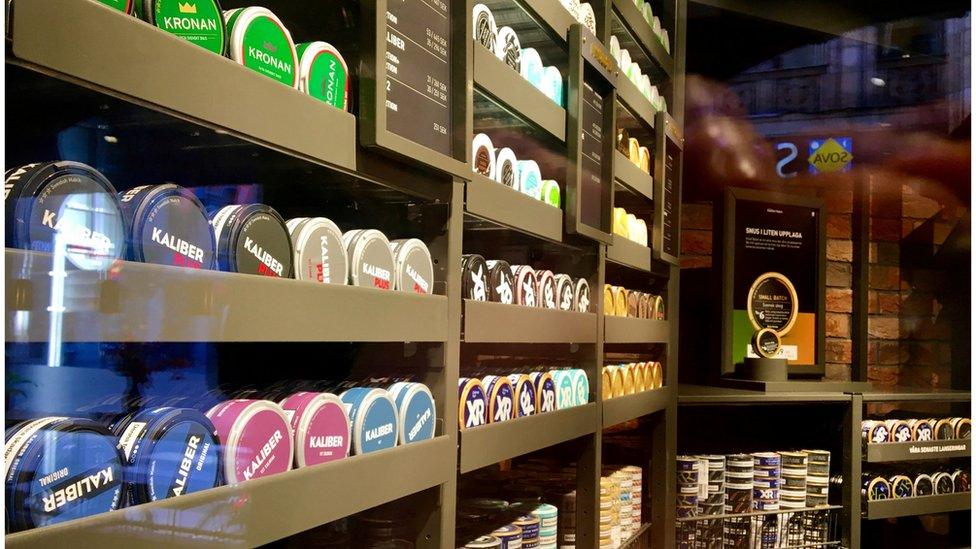Call to ban nicotine pouch sale to under-18s
- Published

Health campaigners are calling for a loophole to be closed that allows a nicotine product to be sold over the counter and online to under-18s.
Nicotine pouches - small parcels of nicotine that fit under the lip - are sold in most UK supermarkets.
But while the sale of cigarettes and e-cigarettes is forbidden to under-18s, pouches are not regulated in the same way.
Action on Smoking and Health (Ash) says the lack of rules is a "Wild West".
Nicotine pouches are not regulated under rules that cover tobacco or vaping products, or as a medical product.
Hazel Cheeseman of the anti-smoking charity Ash, told the BBC that better legal regulation was needed - to ban free samples and sales to under-18s, introduce limits on strength and to restrict marketing of the pouches.
"Companies are operating to what the law allows," she added. "There is extensive promotion and no way to know if they're being sold to people under 18.
"We need a regulatory framework that captures all nicotine products."
The pouches come in a variety of flavours with a packet of 20 usually costing £6.50.
Leading brands have introduced their own restrictions on age of sale and warnings on packaging.

Mark Oates, 32, founded the Snus and Nicotine Pouch Users Association
Nicotine pouches are similar to snus, an oral smokeless tobacco product primarily used in Norway and also in Sweden, the only European Union (EU) country where it is legal. Snus contains tobacco and is illegal in the UK and the rest of the EU.
Former smoker Mark Oates, 32, founded the Snus and Nicotine Pouch Users Association and agrees regulations should be reviewed.
But he adds: "We aren't going to get rid of people using nicotine, people are always going to be looking for something that gives them pleasure."
Reem Ibrahim, 20, from London, also quit smoking using nicotine pouches and found the ease of using them helped her.
But she said a lot of people are "bewildered" when she uses them, and said more people should know they exist.
"Since using them I've been able to quit smoking; completely cold turkey."

Snus is sold in Sweden and contains tobacco, which nicotine pouches do not
New figures from Ash suggest that the number of people using the pouches in the UK is small.
In its survey of 13,000 people, about one in 25 had tried nicotine pouches and awareness was highest among 18 to 24-year-olds, with 45% having heard of them.
In a statement, the Department of Health and Social Care said: "We continue to review the impact of nicotine pouches, including by commissioning an expert committee to investigate their risks."
The Committee on Toxicity of Chemicals in Food, Consumer Products and the Environment (COT) is due to publish a report later this autumn.
Dr Leonie Brose, reader in nicotine research at King's College London, agreed the current regulation should be reviewed.
She said: "If you are a smoker, then moving to something else is a good idea, but if you've never smoked it's not a good idea to take up nicotine because it is addictive and may produce a dependence."
Dr Brose highlighted a recent study into nicotine pouches by the German Federal Institute for Risk Assessment. This found there are risks of nicotine exposure to certain groups because of its addictive nature, and concerns it raises a person's heart rate and blood pressure.
But it concluded that switching from cigarettes to nicotine pouches could represent a reduction in the health risk for a person who smokes, if they stop completely.
Calls for more regulations of nicotine pouches have been welcomed by one of the UK's largest nicotine pouch providers, Nordic Spirit, owned by the tobacco company Japan Tobacco International (JTI).
Its spokeswoman, Nicky Small, told the BBC the company has spearheaded a self-regulation framework which governs the marketing of the product and limits access to over-18s.
She defended its presence at major festivals this summer where free samples were given away, saying it was "a way for existing adult smokers, vapers or nicotine users to learn more about the product".